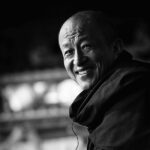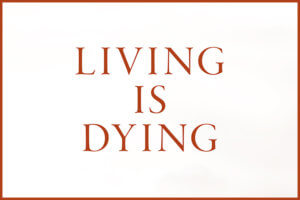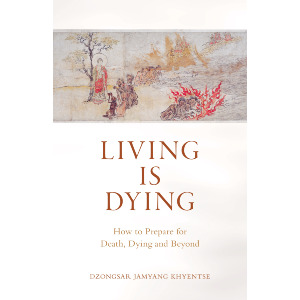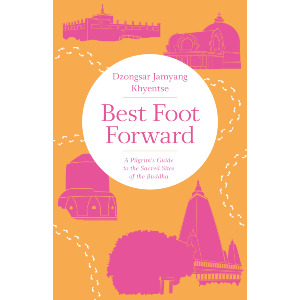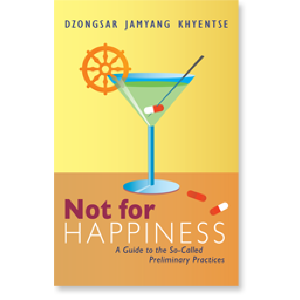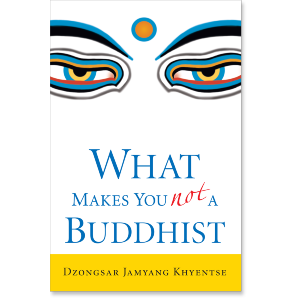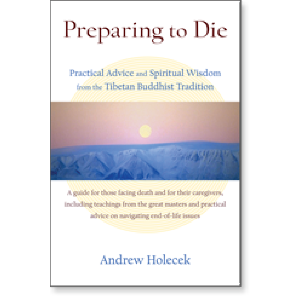An excerpt from Living Is Dying
What can we do for our dying loved ones, especially if they are not spiritually minded, let alone Buddhist? Does encouraging the dying and the dead to take refuge and arouse bodhichitta really help? And can non-Buddhists understand the bardo teachings? These are very good questions.
Confidence and Motivation
First of all, the fact that you want to help the dying person—that you are even thinking about them—indicates that there is a spiritual or karmic link between you.
How many people, animals or insects are dying at this very moment? Are we thinking about all of them? No. Even though, as good bodhisattvas, we are supposed to care for all sentient beings, in practice we rarely do. We tend only to think about those close to us.
Whether they realize it or not, everyone you have a relationship with must have a connection with the dharma. Why? Because they have a connection with you and you have a connection with the dharma. The fact that you want to help them means they must have some merit. So, through you, your dying non-Buddhist friend must have an indirect connection with the dharma that could really benefit them. This is how connections work.
If you have the right motivation, you can be confident that whatever you do will help.
You may be poor and powerless from a worldly point of view, but a rich, famous, powerful person who is clueless about anything spiritual is of no use to someone who is dying. Your concern for your dying friend’s well-being and willingness to support and care for them is the best news they could possibly have. You may be the only person they know with an interest in the dharma who can give them the information they will need to navigate the process of death and beyond, and to do the relevant practices. Your good aspirations, guidance and dedication are probably the only truly useful help they will be offered. They are incredibly fortunate to know you.
If you have the right motivation, you can be confident that whatever you do will help. Even if you lose your temper because you are overtired or frustrated, it won’t be a big deal. After all, who knows what truly helps and what doesn’t? Everyone is different. All you can do is offer the help you believe will work best.
Create a Calm and Peaceful Atmosphere
If the dying person is in pain and terrified, but unwilling to tolerate spiritual discussions or practices, don’t try imposing any of your Buddhist ideas or methods on them. Simply create a harmonious and peaceful environment, and always be honest and direct. The calmer a person is at death, the better. This means that the attitude, bearing and body language of the friends, family and those caring for the dying person are important; it is up to them to create a calm and loving atmosphere. Most important of all is your motivation. Bear this in mind when you find yourself overwhelmed by emotion. Instead of breaking down, try to focus on calmly and gently embodying kindness and compassion.
Surprisingly, perhaps, non-Buddhists often end up facing death in a calmer frame of mind than many Buddhists. Just because someone is a Buddhist does not mean they will always be calm and self-possessed. People who are twitchy and agitated, nervous and fidgety, obsessive and unable to let go in life won’t suddenly become serene and relaxed just because they are about to die.
Also bear in mind that physical nervousness and agitation don’t necessarily mean that the dying person is not focused or that they don’t know what they should be doing. So don’t try to foist your interpretation of their frame of mind on them.
If the dying person is a Shravakayana practitioner, they will try to dwell in egolessness or think about the Buddha, Dharma and Sangha; and a Mahayana Buddhist will try to dwell in the view of shunyata. A Tantrika will think about their guru as they die, or the names and forms of Amitabha Buddha, Shakyamuni Buddha, Akshobhya Buddha, Avalokiteshvara, Guru Rinpoche Padmasambhava, Manjushri, Arya Tara, and so on; and at the moment of death, they will think of their personal deity—their yidam.
Always Tell the Truth
Till now
I thought that only
others die—
that such happiness
should fall to me!
—Ryoto
However difficult the truth may be to hear, it is always best to be honest with a dying person. Most of us would try to avoid telling a person we love that they are dying, even when it is blatantly obvious. We lie because we don’t want to admit to ourselves that someone we love is about to leave us. Hope makes us hide the facts from both ourselves and our loved one.
[N]one of us knows when or how we will die . . .
People who didn’t lead spiritual lives sometimes imagine that they are the only ones ever to have experienced the suffering of death, which obviously is not true. Remind them that no one on this earth has a choice about dying; everyone dies. But it is also worth pointing out that there is no telling which of you will die first. Right now, your loved one may be in the midst of the process of dying, but as none of us knows when or how we will die, there is no guarantee that you won’t die first.
Can I Really Help?
Without being enlightened it is impossible to know if anything you do ever helps anyone—the living or the dying. However good your intentions, you will never know if the medicine you encourage a sick friend to take helps him, or makes things worse. Your friend’s health may appear to improve dramatically, but in the long run the side effects could be devastating, and vice versa.
As I have already said, the most important thing about the help you offer is your motivation. Whether the person you are trying to help is an atheist or very spiritual, a close friend or a complete stranger, if you have a kind heart and a pleasant smile, if you are warm, polite and humble, and if you genuinely wish to improve that person’s life or death, they will appreciate everything you do for them. In fact, they will probably appreciate your help more than the help they are offered by a closer friend or family member who acts out of duty, not love.
Should We Talk about Death?
Buddha said that of all mindfulness meditations, the mindfulness of death is the most important. Talking about death is never inauspicious. In fact, we should all talk about death far more than we do. We will all die, so death is not just a subject for the dying or the very old. I think everyone should be encouraged to think and talk about death. Perhaps we should sponsor giant billboards in big cities and subway stations that say things like: “Your life is ticking away” and “Every second brings you closer to death.” And shouldn’t birthday celebrations include the reminder that death is now one year closer?
If you want to introduce death into a conversation with materialists who dismiss anything spiritual as mere superstition, you must do it skillfully. In this human realm, difficult-to-handle subjects tend to be ignored or denied, so bringing up the subject of death too directly could risk alienating those you are trying to help.
Try offering them a little information about the dharma, but don’t drown them in it!
Concentrate instead on gently introducing them to a little general information about impermanence. Point out that impermanence and change aren’t necessarily negative. In fact, impermanence is what makes improvement and change possible. Tell them it is because everything is impermanent that we can change our lives for the better. But before any improvements can be made, we must first understand and accept the impermanent nature of phenomena. After that, you can gradually introduce the fact that life itself is impermanent.
Of course, the approach you take will depend on the person you are trying to help. Materialistic people tend only to care about their own money, worldly power and position, and how their networks and connections can bring them more money and power. Such people don’t bother visiting museums because, for them, it is a waste of time and time is money. The only time they even consider getting up early to enjoy a sunrise, or change their plans to see the sun set, is when they want to impress another rich person by using the view as a backdrop for a selfie. Starting a conversation about death or anything spiritual with such a person is far from easy. If you cannot talk about poetry or philosophy with someone because there is no money to be made from either, how can you talk about death? All you can do for materialistic people is pray for them.
Having said that, people who give the appearance of being committed materialists sometimes turn out to be surprisingly spiritual, they just don’t realize it. In pursuit of material satisfaction, materialists experience so much of the world; they go everywhere, do everything and eat at all the best restaurants. When such people become weary of the high life, they have a much better chance of becoming genuinely spiritual than many self-professed Buddhists, Christians or Hindus. Too many “spiritual” people are merely spiritual materialists. They spend their lives deceiving both themselves and others, and they are the most difficult to deal with when it comes to discussing death or any form of genuine spiritual practice.
Your friends and family may say they are not spiritual, but if they take pleasure in magical and mystical pursuits like poetry or philosophy and if they are sentimental and romantic enough to enjoy a sunset as if it were their last, they may well have the capacity to hear the truth. Try offering them a little information about the dharma, but don’t drown them in it! The most precious gift you can give your friends, children and family is the dharma. Try pouring a little into their ears, but don’t overdo it. Don’t ever use a dharma argument to correct someone’s behavior; wait for them to do something admirable, motivated by altruism, and only then introduce them to an aspect of the dharma as a way of agreeing with and encouraging them. Never impose your beliefs on others; it won’t help.
How to Comfort the Dying
Encourage the dying person to let go of all their attachment to and worry about unfinished business, tasks, plans, and so on. Encourage them not to dwell on thoughts of their loved ones, houses, jobs or anything that ties them to this life.
Advise the dying person to calm their minds and prepare for the next phase by making good aspirations. What kind of good aspirations should a non-Buddhist make? They could, for example, wish for
- a genuinely good person to run for president of the United States in the next election,
- environmental problems associated with global warming to be resolved,
- more trees to be planted and nurtured,
- inexpensive solutions for debilitating, chronic diseases to be discovered, with no nasty side effects, and
- a car to be invented that runs on free, clean energy, leaves no carbon footprint and emits positive energy into the environment.
Some people spend their whole lives worrying about their material goods; that won’t suddenly change just because they are dying.
If you know the dying person personally, you will have some idea about what they believe in. Even the worst person in the world must believe in something that is not harmful, so capitalize on that belief. Perhaps they could aspire for a two-day working week?
You could also suggest that the dying person does something to bring themselves fame once they are dead. Perhaps they could donate all their money to erecting the kind of billboard I have already mentioned that remind the rest of us about the reality of death—a reality that we will all have to face sooner or later. Or something like that.
Ask the dying person what you can do for them. Ask them what should be done with their money, investments, property and belongings, and promise you will do your best to ensure their wishes are carried out to the letter. Some people spend their whole lives worrying about their material goods; that won’t suddenly change just because they are dying. But knowing that you will do everything in your power to carry out their wishes may help relieve their anxieties. This is another reason why it is a good idea to tell those you care about that they are dying.
If the dying person is a Shravakayana or Mahayana Buddhist, remind them of the importance of aspiration. Encourage them to aspire to become enlightened, to be reborn with the ability to be of benefit to others and to encounter the right path—which, from a Buddhist point of view, is the Buddha Shakyamuni’s path of loving compassion and nonduality. Continue repeating this same message either verbally or mentally, even after the person has died.
If the dying person is a Tantrika, read the simplified instructions that appear on pages 191–95 or from Great Liberation through Hearing in the Bardo, or choose any of the authentic bardo instructions (elaborate or simple) that you know, or one of the texts that are available for download.
Read the instructions out loud to remind the Tantrika about what is happening and what they should do.
If the dying person’s relatives are Buddhists, they could read an Amitabha sutra out loud or chant their favorite mantra or dharani.
Tell the dying person’s relatives and friends that, according to the bardo teachings, their loved one’s awareness and perception will continue to function for anything from a few hours to several days after death. This means that the dead person’s mind will be able to see and hear what goes on among the family after their body has been pronounced dead. This is why Tibetans always advise a dying person’s family to avoid talking about the will or fighting over the person’s belongings. The family is also advised not to give away the dead person’s property or break up their collections for as long as possible.
Share
$18.95 - Paperback
$19.95 - Paperback
$18.95 - Paperback
$18.95 - Paperback
$18.95 - Paperback
$34.95 - Paperback
